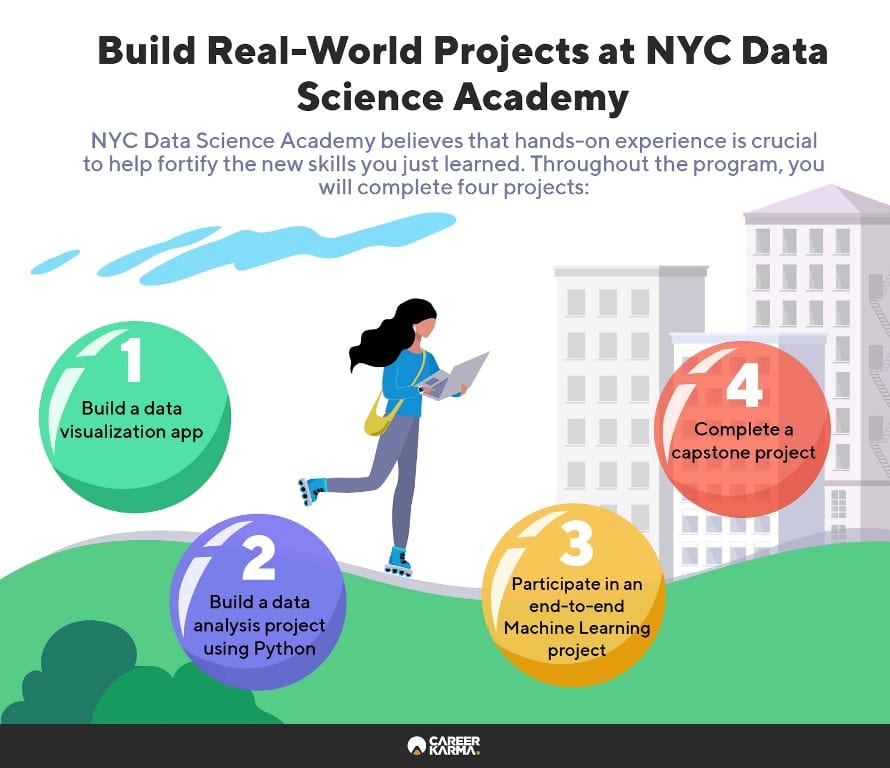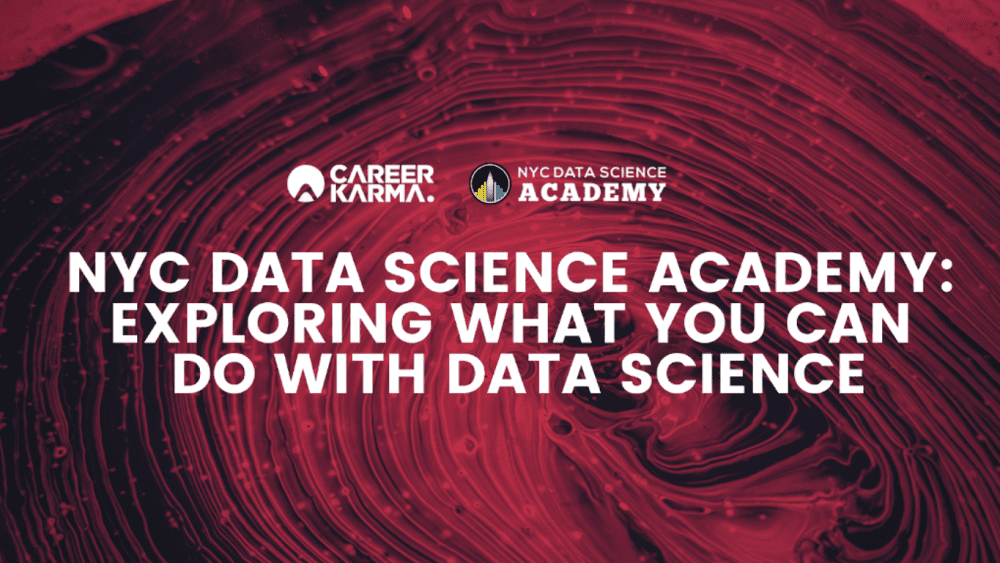The story of NYC Data Science Academy began in 2013 when the founder identified a gap in the job market. As experienced data scientists and big data professionals in their own right, they saw a need for a well-rounded training program that prepares aspiring data scientists to enter the workforce. Their solution to this is a bootcamp that focuses not only on the theoretical aspects of data science but also on the practical side with its competency-based, industry-informed curriculum.
NYC Data Science Academy’s mission is to provide accelerated data science training courses to prepare people for employment opportunities across all industries. Its hands-on teaching style stands at the core of this mission and thus far, has proven to be effective. To date, NYC Data Science Academy has helped over 2,000 people enter the data science field.
NYC Data Science Academy Curriculum: A Hands-on Experience
An instrumental part of the NYC Data Science Academy curriculum is the real-world, company-sponsored projects that students will complete during their time in the bootcamp.
The first three projects focus on different areas of data science. Each project will use the theoretical materials students have learned in each portion of the course and put it to practical use.
The fourth of these projects is a capstone project, an exciting opportunity to put student’s learning to the test and come out of the program with a concrete example of their capabilities in data science to show future employers.
“The curriculum was truly cutting-edge, and the projects involved tackling real-world problems,” says Katie Critelli, a graduate who is now a data scientist at Deutsche Bank.

Project 1: Building A Data Visualization App
The bootcamp begins with the data science toolkit course and data analytics with Python course where students will be taught theoretical content. Students will then move on to other tools like SQL and traditional databases, data analysis with Python, as well as visualization packages.
By the end of Week 2, students will have their first project day where they will create a project on Exploratory Visualization and Shiny. This involves building a data visualization app from scratch, using R. This project will use the techniques, machine learning, and advanced data science methods and strategies learned so far in the course. Students will present their projects as they learn to implement and communicate the theoretical and technical skills they recently acquired.
An example of this project is Sara Kien’s Shiny project which answers an important e-commerce question: “Given the importance of positive reviews for consumer products, one important question is: Are all positive reviews treated equally? In other words, are some types of positive reviews more effective than others?” This project uses Shiny and Github to “Compare experiential, emotional, and functional framing of Alexa enabled vs. non-Alexa enabled Amazon products in consumer reviews” and to “examine whether experiential and emotional framing in consumer reviews predicts consumer interest in Alexa products.”
Project 2: Building a Data Analysis Project with Python
This project is completed after students have gone through the data science with Python and data analytics section of the course. In this course, students will learn the R programming language for data analysis. They’ll learn to load, save, and wrangle data using R and relevant libraries such as the Tidyverse collection.
They will also learn to derive insights from data, use statistical techniques, test hypotheses, and basic statistical modeling as well as visualization. After this, students embark on a web scraping project which will put to use their theoretical knowledge of analyzing data in R. This involves building a web parsing and data analysis project using Python.
An example of this project is David Kim’s web scraping project which sought to “provide trends and insights to inform prospective buyers of lab diamonds for engagement rings.” He used the techniques gained in this section of the course to scrape, analyze and process data from a wide variety of databases and libraries.
Project 3: Machine Learning
After continuing in more advanced levels of the machine learning material, learning in both R and Python, students will participate in an end-to-end machine learning project.
William Zhou, an alumnus who is now an Informatics Specialist at Memorial Sloan Kettering Cancer Center, had the chance to participate in a Kaggle competition to predict real estate pricing in the Russian market which involves machine learning techniques.
“That allowed me to apply what I had learned about algorithms and models. Though that was my first Kaggle competition, my group was able to achieve the top 1%, and that really boosted my confidence for job interviews.”
Project 4: Capstone Project
After the final advanced topics of the curriculum are covered, students will participate in a capstone project, the final step in the bootcamp. The capstone project allows students to create their own data product which showcases their interests and specific talents. Students may use any programs, material, or techniques covered in the class to create this.
Some examples of exciting capstone projects that students have completed include projects which identify medicare fraud through machine learning, predict winners of tennis matches, predict early readmissions in diabetic patients, or forecast loan defaults. Subject matter ranges widely and can be tailored to suit the student’s passion.
In Levonian, Atuahene, Toledano, and Yates’ capstone project, they trained predictive models, deploy them in their portfolio optimization process, and found that: “Simulated out-of-sample returns can reach 10-12%, which makes LendingClub loans an interesting asset to invest!”
As Denis Nguyen, an alumnus who is now working for Ameritas Life Insurance Corp, says, “The projects are very very important. Anyone can say ‘I know how to do this’ on their resume, but a portfolio of projects actually proves it. The fact that we do four projects gives you a lot of opportunities to showcase different skills.”
Student Success
Since its founding in 2013, over 2,000 students have graduated from NYC Data Science Academy and gone on to become data science professionals. Across alumni, the dominant sentiment is that the bootcamp’s projects and hands-on, real-world learning approach have helped them feel confident in interviews and land great jobs.
Sofia Wang, who now works as a Business Intelligence Analyst at The Trade Desk, says, “Throughout the bootcamp, I learned of many DS/ML concepts that are widely applied across different roles and companies, [and] the projects assigned were the best way to apply and practice the things I learned, and I was eventually able to apply them in my own job.” She says that she got her current position thanks to the stories she was able to tell about the projects she worked on at the bootcamp.
Hayley Caddes, a Chemical Science Engineer graduate from Columbia University who is now a Lead Data Scientist at BerlandTeam, realized while she was on a job search in her field that many of the positions she was interested in required knowledge in data science. After extensive research, she decided on NYC Data Science Academy.
“The boot camp really starts ramping up when you begin doing projects […] The coolest project we did was the capstone project, that’s where you get total freedom.”
She notes that one of the first questions she was often asked in interviews was about whether she’d worked in certain programs and software, which she was able to demonstrate that she had, because of her capstone project.
As Joe Lu, a data scientist at Fidelity Investments, notes, “By the end [of the bootcamp], students have a complete portfolio of four projects to showcase to employers, complete with GitHub code, business summaries (blog posts), and a LinkedIn profile tailored towards the job search.”
Training for Data Professionals
NYC Data Science Academy is a proprietary school for advanced education and training, that brings together quantitative thinking and application, research, data processing, automation, exploratory visualization, analysis, and presentation. Its training for data scientists is carried out through its pioneering, caring, collaborative learning environment, and its industry-embraced curriculum and project-based method.
The projects are challenging and meant to encourage students to use their freedom and creativity to create projects that combine their interests and talents.
As David Steinmetz, alumni and now Machine Learning Engineer at Capital One, says, “There is so much to learn in the field, so pick one thing and learn it well before moving on to another. Learning many things superficially will backfire once you get into the interview or onto the job. Deep understanding and the capacity for further learning are necessary. A bootcamp is a great way to get both the deep understanding and cover the breadth of material necessary to get you started in the field.”
If hands-on, creative, real-world experience in data science sounds like the right fit for you, learn about NYC Data Science Academy’s application process here, and begin applying here.
About us: Career Karma is a platform designed to help job seekers find, research, and connect with job training programs to advance their careers. Learn about the CK publication.




